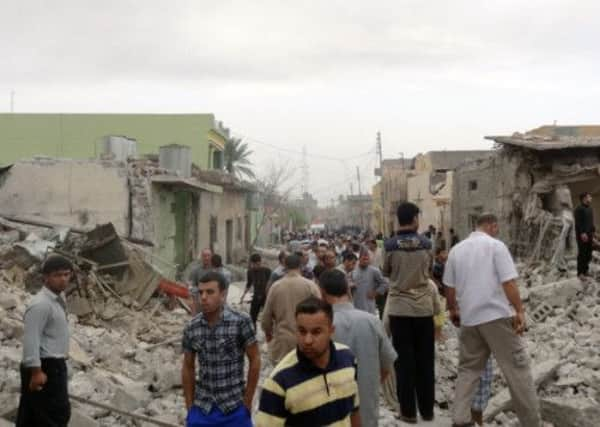Iraq violence grows with fresh wave of car bombings


Two car bombs went off in the northern town of Tuz Khurmato, a device activated in a cattle market in Kirkuk and a suicide bomber struck in the town of Tarmiyah.
The latest spate of attacks has marked the period as one of the most violent in Iraq in recent months and have been linked to growing political and sectarian tension.
Advertisement
Hide AdAdvertisement
Hide AdThree people were killed when the bombs went off simultaneously in Tuz Khurmato, a town populated mainly by ethnic Turkmen.
The town is claimed by the government in Baghdad and by ethnic Kurds, who inhabit a semi-autonomous region in the north.
Elsewhere, gunmen and a suicide bomber killed three people in an attack on an army patrol in a Sunni area of Tarmiyah, which lies about 30 miles north of Baghdad.
And another six people died when three bombs exploded in the cattle market in al-Aruba district in Kirkuk, which lies further to the north of the country.
The string of attacks also left dozens of people, including women and children, injured.
Iraq’s prime minister, Nouri al-Maliki, vowed to make immediate changes to the country’s security strategy and pledged that militants “will not be able to return [Iraq] to the sectarian conflict”.
No group has claimed responsibility for the on-going attacks, which comes as tension between the Shia Muslim majority, which leads the government, and minority Sunnis increases to grow.
Violence has surged over the past month since an army raid on a Sunni anti-government protest camp near the northern town of Hawija left 50 people dead.
Advertisement
Hide AdAdvertisement
Hide AdThe demonstrators accused the government of targeting the Sunni community, which the government denies.
There are fears the level of violence might return to the kind reached at its peak in 2006 and 2007.
Ten years after the US-led Iraqi invasion that toppled former president Saddam Hussein, Iraq’s Sunnis, Shiites and Kurds have yet to find a stable power-sharing deal and there had been fears of escalating ethnic violence.
The conflict in Syria, where mostly Sunni rebels are fighting to topple president Bashar al-Assad, is turning in part into a regional proxy war between Sunni and Shiite powers.
Lebanon’s Iranian-backed Shiite Hezbollah group is now openly fighting alongside Mr Assad’s forces, which are dominated by members of his minority Shiite-linked Alawite sect.
Iraq’s Sunnis, who resent their treatment by Shiite Mr Maliki’s government, have staged mass protests since December.
Sunni militants, some of them linked to al-Qaeda, have exploited the unrest, urging Sunnis to take up arms.
More than 700 people died violently in Iraq in April, according to the United Nations, the highest monthly figure in almost five years. The country previously suffered a frenzy of Sunni-Shiite violence in 2006-7, when monthly death tolls sometimes topped 3,000.